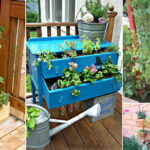Gardening, an ancient pursuit rooted in human history, offers more than mere aesthetics or a source of sustenance; it represents a tapestry of identity and a means of cultivating joy. The question of who loves gardening can lead us down myriad paths, yet a unifying theme emerges: a deep-seated connection to nature. This article seeks to explore the various profiles of those who find solace and satisfaction in gardening, delving into the psychological, social, and environmental benefits this age-old practice confers upon its most ardent admirers.
The Allure of Gardening: Who Are Its Devotees?
Individuals who gravitate towards gardening often share common traits, yet they are painted with the broad strokes of diverse backgrounds and experiences. Gardeners can be simply classified into a few archetypes, each embodying unique motivations for their passion.
The Nurturers: Caregivers at Heart
Often found tending to their verdant realms with meticulous care, these gardeners derive profound joy from nurturing living things. Davey, et al. (2020) suggest that nurturing behaviors trigger dopamine releases, enhancing feelings of happiness and satisfaction. Nurturers typically possess a deep empathy for life. Their gardens become sanctuaries, a space to express their caring disposition, facilitating an emotional connection not only with plants but also with their immediate environment and those around them.
The Creatives: Artists in Nature
For some, gardening transcends the mundane act of planting and watering; it becomes a canvas for artistic expression. These gardeners use flowers, shrubs, and trees to create visual spectacles that reflect their unique aesthetic sensibilities. The interplay of colors, shapes, and textures fosters profound satisfaction. They often draw inspiration from environmental art movements, integrating their creations harmoniously with the surrounding landscape. The act of gardening, for them, is akin to painting on a canvas, where every bloom and budding leaf adds to the overall masterpiece.
The Nurturers and Creatives: Gardening as Community
Gardening enthusiasts often form communities that foster connection and collaboration. Community gardens serve as focal points where individuals of varied backgrounds come together, promoting social interaction and mutual support. These spaces enhance social capital, enabling participants to bond over shared interests. For individuals seeking a sense of belonging, community gardening offers a remedy to urban isolation. Scholars argue that participation in such endeavors fosters a sense of stewardship towards the environment and each other, resulting in more engaged and resilient communities (Hale et al., 2011).
Beyond demographics and psychological profiles, exploring the underlying reasons why gardening elicits joy reveals the multifaceted advantages this pastime offers, creating a richer understanding of its significance.
The Psychological Benefits of Gardening
Serotonin and dopamine, neurotransmitters associated with mood regulation, play a crucial role in the brain’s response to gardening. Engaging in horticultural activities elevates levels of these chemicals, promoting feelings of happiness and contentment. Research highlights that participants in gardening report reduced levels of stress and anxiety, contributing to overall mental well-being (Kaplan, 2018).
The Therapeutic Aspects of Gardening
Gardening serves as a therapeutic avenue for many individuals. The practice of planting, nurturing, and cultivating provides a sense of control and accomplishment that can be particularly beneficial for those coping with mental health issues. Studies demonstrate that engaging with nature fosters mindfulness, allowing individuals to immerse themselves in the present (Gonzalez et al., 2018). This immersion results in decreased rumination and improved focus, providing a natural antidote to the stresses of modern life.
Physical Health and Well-Being through Gardening
Beyond mental health benefits, gardening promotes physical well-being. Engaging in physical labor in the garden can increase cardiovascular fitness, enhance strength, and offer flexibility benefits. The moderate-intensity exercise involved in gardening activities aids in weight management and reduces the risk of several chronic diseases. Moreover, sunlight exposure during gardening ensures adequate Vitamin D levels, further supporting overall health (Morris, 2020). Gardeners not only create beauty in their surroundings but also cultivate longevity and vitality.
The Ecological Impact of Gardening
Gardening’s joys extend beyond individual well-being to encompass the broader ecological landscape. Enthusiasts often prioritize sustainable gardening practices, making choices that benefit biodiversity and environmental health. Native plants, organic fertilization, and integrated pest management are increasingly common practices among conscientious gardeners. Such choices contribute to the preservation of local ecosystems and the promotion of sustainability, allowing the flowering of both personal and planetary health.
Gardening as an Educational Tool
Gardening represents a powerful educational medium. By engaging individuals—particularly children—in gardening, opportunities for learning abound. Curriculum-based gardening programs emphasize not only agricultural techniques but also nurtures an understanding of ecology and responsibility towards nature. Teaching children to cultivate plants instills values of patience, accountability, and environmental stewardship (Davis, 2021). Students learn the cycles of nature, the value of nutrition, and the significance of sustainable practices in a hands-on, experiential manner.
Moreover, adult gardening enthusiasts often take it upon themselves to disseminate knowledge and skill through workshops and community engagement endeavors. These educational efforts not only empower novices but also reinforce the interconnectedness among participants, creating threads of community engagement and ecological awareness.
Conclusion: The Joy Derived from Gardening
The myriad motivations driving individuals toward gardening encapsulate a harmonious blend of psychological, social, and ecological factors. Understanding the complex identities of gardeners allows for a deeper appreciation of this multifaceted pursuit. The joy derived from gardening is not merely a product of cultivating plants; it is inexorably tied to nurturing emotional well-being, fostering community connections, promoting physical health, and contributing positively to the environment.
Thus, the act of gardening emerges as a potent reminder of our intrinsic connection to nature, reflecting a commitment to nurturing not only flora but also our mental, social, and ecological landscapes. In a world often characterized by disconnection and chaos, gardening stands as a verdant sanctuary, offering solace, joy, and fulfillment to those willing to cultivate this timeless practice.









Leave a Comment